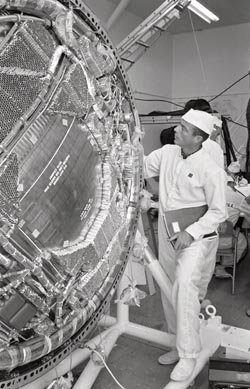|
Fifty years after the former Soviet Union intensified the Cold War by firing the first shot in the “space race” with the launch of Sputnik, the world’s first artificial satellite, Temple University’s colleges of Science and Technology and Liberal Arts will co-host a half-day conference exploring the launch’s impact on history, culture, science and technology.
The conference, which will feature panel discussions and lectures — including one by former Mercury Astronaut Scott Carpenter, will be held Friday, Oct. 5, on Temple’s Main Campus.
As one of the original seven Mercury astronauts, Carpenter was on the front lines as the United States and the Soviet Union dueled for dominance in space, a competition that saw the creation of NASA and ultimately, the United States landing men on the moon in 1969. Carpenter, a former Navy commander and the second American to orbit the earth, will discuss the “U.S. Response to Sputnik” at 3:30 p.m. in the Great Court of Mitten Hall, 1913 N. Broad St.
Carpenter’s lecture will be immediately followed by a lecture on “Space Exploration and the Cold War: A Soviet View” by Vladislav Zubok, an associate professor of history at Temple who grew up in the Soviet Union and is co-author of Inside the Kremlin's Cold War. From Stalin to Khrushchev.
|
Photo courtesy of NASA
Astronaut Scott Carpenter examines the structure his Mercury capsule, nicknamed "Aurora 7," a few months before his spaceflight in May 1962.
|
|
“Because of Sputnik, there awakened a fear in the United States of falling behind in science and technology development. This led to a very widespread effort, from government to education, to re-establish the nation's performance in science and technology research,” said Hai-Lung Dai, dean of the College of Science and Technology and Laura H. Carnell Professor at Temple.
“Fifty years later, the U.S. is a dominating force in these areas, but there are symptoms indicating that we may once again fall behind. Remembering this event gives us a chance to examine whether there is a science and technology education crisis in the United States, and, if so, how we should respond,” said Dai.
The conference will kick off at 2:15 p.m. in Ritter Hall’s Walk Auditorium, 1301 Cecil B. Moore Ave., with an hour-long panel discussion on the “Impact of Sputnik on American Culture.” Panelists will include Dan Davidson, professor of Russian and second language acquisition, Bryn Mawr College; and Beth Bailey, professor of history at Temple.
Immediately following Carpenter’s and Zubok’s lectures, a second panel discussion on “Science and Technology in the U.S. 50 years after Sputnik” will be held at 4:30 p.m., also in the Great Court of Mitten Hall. Panelists will include John Ambroseo, CEO of Coherent, Inc.; Mark Cardillo, executive director of the Camille and Henry Dreyfus Foundation and former department head of Bell Labs; Derek Pitts, chief astronomer of the Franklin Institute; and P. Roy Vagelos, chair of Regeneron and former CEO of Merck and Company, Inc.
For more information on the program, visit http://www.temple.edu/sputnik/
|
